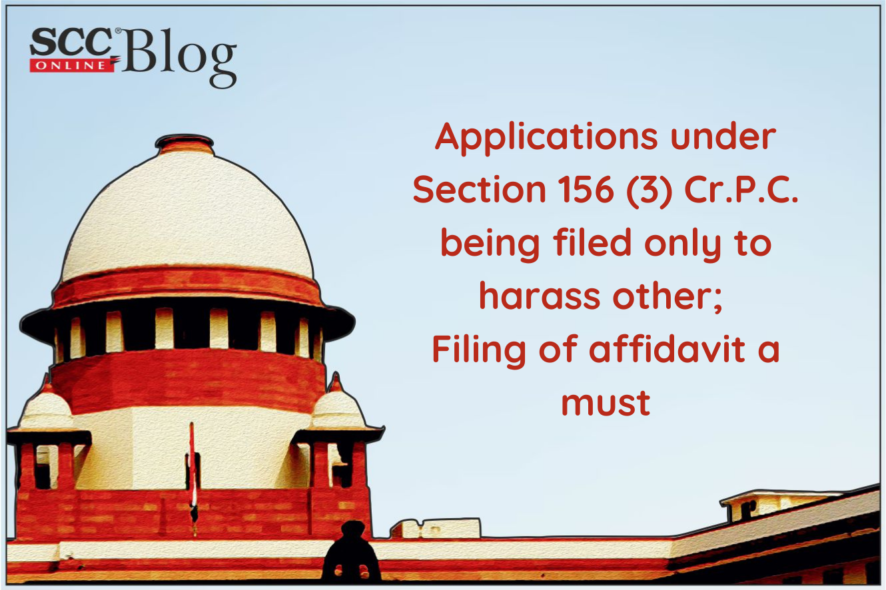Supreme Court: In a case where the Magistrate had passed an order under Section 156(3) CrPC even in absence of an affidavit duly sworn by the complainant, the bench of BR Gavai* and Krishna Murari, JJ that many a times the applications under Section 156 (3) of the Cr.P.C. are filed in a routine manner without taking any responsibility only to harass certain persons and hence, such applications are to be supported by affidavits.
The Court held that, prior to the filing of a petition under Section 156 (3) of the Cr.P.C., there have to be applications under Section 154 (1) and 154 (3) of the Cr.P.C. Filing of an affidavit is necessary so that the persons making the application would be conscious and not make false affidavit. With such a requirement, the persons would be deterred from causally invoking authority of the Magistrate, under Section 156 (3) of the Cr.P.C. If the affidavit is found to be false, the person would be liable for prosecution in accordance with law.
Factual Matrix
The Court was deciding a case where the parties entered into various Agreements for Sale with respect to properties situated at Bangalore. It is the case of the appellants that, after receipt of the payments, the respondent was avoiding to get the Sale-deed registered. The respondent, on the other hand, filed a complaint, almost after a period of two years from the date of institution of suits by the appellants, and almost after a period of one and a half year from the date on which written statement was filed by respondent, thereby making allegations of cheating. The allegations in the complaints were basically that the appellant No. 1, who is the son of appellant Nos. 2 and 3, had obtained blank stamp papers from the respondents and created Agreements for Sale by misusing the said blank stamp papers. As such, it is case of the respondents that, the appellants committed forgery and cheated them, and as such they are liable for punishment for offences punishable under Sections 420, 464, 465, 468 and 120-B IPC.
The Magistrate ordered that,
“In the complaint, the complainant has made serious allegations against the accused persons. Therefore, it appears this court that, it is just and proper to refer the matter to the jurisdiction police for investigate and submit report.”
The Karnataka High Court also refused to interfere with the order.
Ruling
The Court held that the Magistrate was required to apply his mind before passing an order under Section 156 (3) of the Cr.P.C. It was further submitted that, unless an application under Section 156 (3) of the Cr.P.C. was supported by an affidavit duly sworn by the complainant, the Magistrate could not have passed an order under the said provision.
When the complaint was not supported by an affidavit, the Magistrate ought not to have entertained the application under Section 156 (3) of the Cr.P.C.
The Court was of the opinion that, though power to quash criminal proceedings should be exercised very sparingly and with circumspection and that too in the rarest of rare cases, there are certain category of cases wherein such power can be exercised for quashing proceedings.
One of such categories laid down in State of Haryana v. Bhajan Lal, 1992 Supp (1) SCC 335 is,
“Where a criminal proceeding is manifestly attended with mala fide and/or where the proceeding is maliciously instituted with an ulterior motive for wreaking vengeance on the accused and with a view to spite him due to private and personal grudge.”
In the case at hand, since the complaint was filed almost after a period of two years from the date of institution of suits by the appellants, the Court held that continuation of the present proceedings would amount to nothing but an abuse of process of law.
[Babu Venkatesh v. State of Karnataka, 2022 SCC OnLine SC 200, decided on 18.02.2022]
*Judgment by: Justice BR Gavai
Counsels
For Appellants: Advocate Abdul Azeem Kalebudde,
For State: Advocate Shubhranshu Padhi







